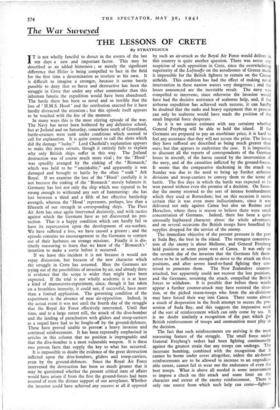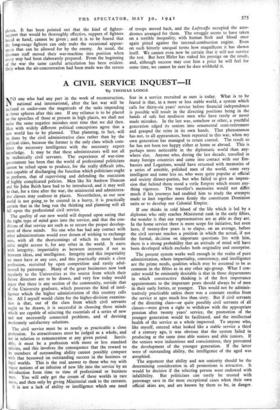The War Surveyed
THE LESSONS OF CRETE
By STRATEGICUS
IT is not wholly fanciful to detect in the events of the last ten days a new and important factor. This may be described as an added bitterness ; or merely the significant difference that Hitler is being compelled to face in the field for the first time a determination as resolute as his own. It is difficult to imagine a stronger, because it seems barely possible to deny that so fierce and destructive has been the struggle in Crete that under any other commander than this inhuman fanatic the expedition would have been abandoned. The battle there has been so novel and so terrible that the loss of H.M.S. Hood' and the retribution exacted for it have hardly distracted the attention ; but this episode itself appears to be touched with the fire of the moment.
In many ways this is the most stirring episode of the war. The Navy has never been bothered by any defensive school, but at Jutland and on Saturday, somewhere south of Greenland, battle-cruisers were sunk under conditions which seemed to call for explanation. It is quite correct to call the shots which did the damage " lucky." Lord Chatfield's explanation appears to make this more certain, though it entirely fails to explain why only British ships suffer in this way. The Jutland destruction was of course much more vital ; for the ' Hood ' was speedily avenged by the sinking of the ' Bismarck,' which was held to be " unsinkable," and apparently it was damaged and brought to battle by the often " sunk " Ark Royal. If we examine the loss of the ' Hood' carefully it is not because the sinking of the Bismarck ' merely balances it. Germany has lost not only the ship which was reputed to be strong enough to withstand any sort of hammering: she has lost between a third and a fifth of her effective battleship strength, whereas the ' Hood ' represents, perhaps, less than a fifteenth of our strength in corresponding ships. The Fleet Air Arm has once again intervened decisively, and with tactics against which the Germans have as yet discovered no pro- tection. That is a happy condition which can hardly fail to have its repercussion upon the development of sea-warfare. We have suffered a loss, we have caused a greater ; and the episode contains no encouragement to the Germans to venture out of their harbours on strange missions. Finally it is dis- tinctly reassuring to learn that we knew of the ' Bismarck's ' intention to make a sortie before it occurred.
If we leave this incident it is not because it would not repay discussion, but because of the new character which the struggle in Crete has assumed. Here the Germans are trying out of the possibilities of invasion by air, and already there is evidence that the scope is wider than might have been expected. If the trial is not wholly academic it is at least a kind of manoeuvres-experiment, since, though it has taken on a breathless intensity, it could not, if successful, have more than a limited application. The governing condition of the experiment is the absence of near air-opposition. Indeed, in the actual event it was not until the fourth day of the struggle that the Royal Air Force effectively intervened. Until that time, and to a large extent still, the attack of the dive-bomber and the landing of parachutists with gliders and troop-carriers as a sequel have had to be fought-off by the ground-defences. These have proved unable to prevent a heavy invasion and continual reinforcement. It has been repeatedly emphasised in articles in this column that no position is impregnable and that the dive-bomber is a most vulnerable weapon. It is these two proven facts that supply the key to what has occurred.
It is impossible to doubt the evidence of the great destruction inflicted upon the dive-bombers, gliders and troop-carriers, even by the ground-defences. Since the Royal Air Force intervened the destruction has been so much greater that it may be questioned whether the present critical state of affairs would have arisen if from the first the ground-forces had been assured of even the distant support of our aeroplanes. Whether the invasion could have achieved any success at all if opposed by such an air-attack as the Royal Air Force would deliver in this country is quite another question. There was never any suspicion of such opposition in Crete, since the overwhelming superiority of the Luftwaffe on the aerodromes of Greece made it impossible for the British fighters to remain on the Cretan airfields. This condition has had the effect of making na'-al intervention in these narrow waters very dangerous ; and the losses announced are the inevitable result. The navy was compelled to intervene, since otherwise the invasion would have had the decisive assistance of seaborne help, and, if the airborne expedition has achieved such success, it can hardly be doubted that the tanks and heavy equipment that at present can only be seaborne would have made the position of the small Imperial force desperate.
As it is we cannot estimate with any certainty whether General Freyberg will be able to hold the island. If the Germans are prepared to pay an exorbitant price, it is hard to feel any assurance that they will not secure the prize. The losses they have suffered are described as being much greater than ours; but that appears to understate the case. It is impossible to discount all the reports of correspondents of the German losses in aircraft, of the havoc caused by the intervention of the navy, and of the casualties inflicted by the ground-forces. It seems that the comparative slackening in the attack on Sunday was due to the need to bring up further airborne divisions and troop-carriers to convey them to the scene of battle. The five days in which the battle was expected to l e won passed without even the promise of a decision. On Satur- day the enemy resorted to the sort of intense bombardment which they used at Rotterdam; but on this occasion it seems certain that it was even more indiscriminate, since it was delivered not only against Canea but also on Retimo and Heraclion, where there is reason to believe there were small concentration of Germans. Indeed, there has been a quite unusually haphazard character about the whole adventure; and on several occasions the British troops have benefited by supplies dropped for the service of the enemy.
The immediate objective of the present pressure is the port at Suda Bay, the best in the island. The strongest concentra- tion of the enemy is about Melleme, and General Freyberg held positions at some point west of Canea. It was only on the seventh day of the invasion that the Germans felt them- selves to be in sufficient strength to move to the attack on these positions, and after severe hand-to-hand fighting they con- trived to penetrate them. The New Zealanders counter- attacked, but apparently could not recover the lost positions, and the Germans, resuming the attack, compelled the British forces to withdraw. It is possible that before these words appear a further counter-attack may have restored the situa- tion, or the picked storm-troops who form the air-divisions may have forced their way into Canea. There seems almost a touch of desperation in the fresh attempt to secure the pos- session of Suda Bay, and this suggests the imperative need of the sort of reinforcement which can only come by sea. It is no doubt similarly a recognition of the part which the British reinforcement of troops and ammunition must play in the decision.
The fact that such reinforcements are arriving is the most reassuring feature of the struggle. The small force under General Freyberg's orders had been fighting continuously against the greatest strain that any troops can undergo. The incessant bombing, combined with the recognition that it cannot be borne under cover altogether, unless the air-borne reinforcements are to be allowed to increase to an unpredict- able extent, cannot fail to :wear out the endurance of even the best troops. What is above all needed is some intervention to impose a check on this attack and some limit on the character and extent of the enemy reinforcement. There is only one source from which such help can come—fighter- planes. It has been pointed out that the kind of fighter- support that would be thoroughly effective, support of fighters based at hand, cannot be given ; and it is to be feared that the long-range fighters can only make the occasional appear- ances that can be allowed for by the enemy. As usual, the German staff moved their war-machine into position when every step had been elaborately prepared. From the beginning of the war the same careful articulation has been evident. Only when the air-concentration had been made was the screen of troops moved back, and the Luftwaffe occupied the aero- dromes arranged for them. The struggle seems to have taken on a terrible inequality, with human flesh and blood once again pitted against the internal-combustion engine. Even on such bitterly unequal terms how magnificent it has shown itself. We cannot even now be certain that it will not survive the test. But here Hitler has staked his prestige on the result, and, although success may cost him a price he will feel for some time, we cannot be sure he dare withhold it.































 Previous page
Previous page